As the lockdown in Auckland lengthened, the exposure of one couple’s rule-breaking prompted a predictably intense pile-on. Ironically, that actually helped keep their names out of the headlines - briefly - and it also fired up long-running arguments about the right to know, privilege and fairness.
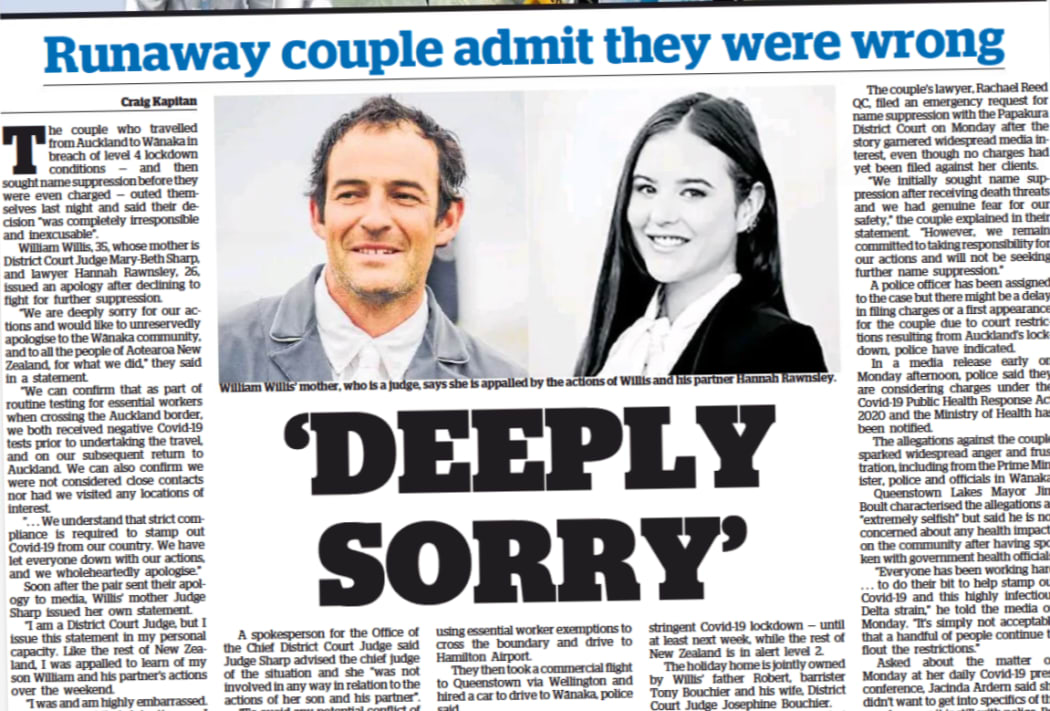
The New Zealand Herald front page on Wednesday. Photo: photo/ RNZ Mediawatch
“You know your country is tiny when you can’t have sex without the prime minister finding out about it,” Stephen Colbert told millions of Americans on the Late show in the US last weekend, riffing on what Stuff dubbed “the Auckland City Hospital sexcapade.”
The 'Wānaka furore' this week showed you can’t slip out of Auckland to a bach at the Southern Lakes without the whole country - and the PM - finding out either.
Both breaches were in the news for the same obvious reason - the risk of spreading the delta variant of Covid-19.
Last week police figures showed 204 people charged under Alert Level 4 rules. A further 529 people were warned for 532 different offences.
But William Willis and Hannah Rawnsley got more media attention this week than all the other cases put together after they left Auckland using an essential worker's permit, drove to Hamilton and flew to Queenstown en route to a family holiday home in Wānaka.
They hadn’t been formally charged with an offence at that point - but the media condemnation was strong.
On Monday morning TVNZ’s Breakfast host Matty McLean called them “dicks” (claiming he was channelling absent co-host John Campbell). The couple were called a lot worse this past week - by an awful lot of New Zealanders.
Keeping a lid on it
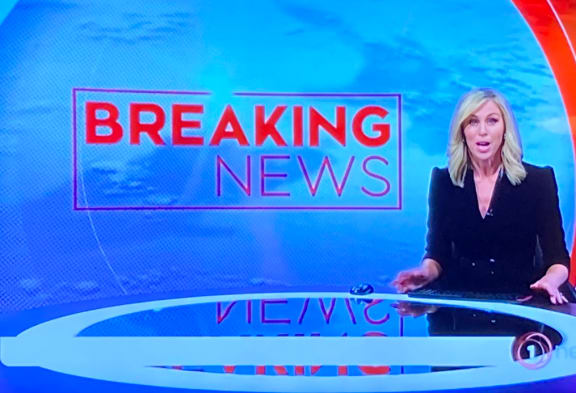
TVNZ 1 News seconds away from reveling the names live at 7pm on Tuesday Photo: screenshot / TVNZ News
By this stage, a QC engaged by the couple had applied for interim name suppression - extending to a parent described as a “high ranking public official”. She turned out to be District Court judge Mary Beth Sharp, who told media she had not been aware of the couple’s intentions.
Later on Queenstown’s mayor Jim Boult told Newshub he was “filthy” about the breach - and soon after his deputy mayor Calum MacLeod gave up a big clue when he said there was was “a horse-feed connection.”
But the couple had already been named and shamed big time for letting down the team of five million on social media.
On some platforms only a couple of characters entered in the search box - or even just ‘Wānaka’ - was enough for the algorithms to bring up the names of the alleged rule-breakers.
RNZ's Checkpoint called the man’s mobile - but he refused to be interviewed - and no-one was home when RNZ reporter Tess Brunton knocked on the door of the holiday home in Wānaka.
As the online pile-on of the couple piled up, so did anger about the name suppression.
The couple ‘going legal’ to keep their names out of the news wound up the media and commentators even more.
"We need to see the law being enforced, with details that will deter others,” said lawyer Stephen Franks, writing on behalf of the Free Speech Union.
“Freedom of speech is our right to know” he said - and “not just journalists’ right to tell us” - though the two obviously overlap.
“True remorse or contrition would have the people charged not trying to hide behind an application that is a byword for privilege,” Franks added.
Out in the open
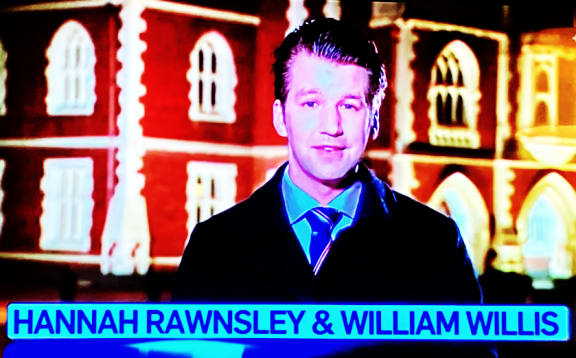
Newshub at 6 revealing the previously-suppressed names of the alleged rulebreakers a 7pm on Tuesday. Photo: screenshot / Newshub at 6
The couple identified themselves in a statement shortly before interim name suppression was due to lapse at 7pm on Tuesday.
They also indicated the online abuse and threats they’d received were one reason for trying to keep their names secret in the first place.
TVNZ 1News extended the bulletin to break the news, and the names, while Newshub’s Giles Dexter - live outside the court in Auckland - did the big reveal live on Three.
After that it was all furrowed brows and deep concern on Three's The Project.
“This isn’t the New Zealand I know and love,” said head-shaking co-host Jeremy Corbett - normally the crew’s funny man. "This is going to hurt these people. Think about mental health and all these things we say. Are we just paying lip service?“ asked Corbett.
No such sympathy on TVNZ1, where Seven Sharp’s Hilary Barry sarcastically thanked the couple for their apology - and suggested a knighthood for whoever dobbed them in. On Newstalk ZB, Heather du Plessis-Allan asked a local boutique owner who that might be. She declined to add to what she called ‘Wānaka whispers’ doing the rounds.
News websites had busted out their breaking news banners to reveal the names and The Herald even had a satirical piece by Steve Braunias ready to roll online - headlined ‘In defence of the Wānaka lockdown breachers.’
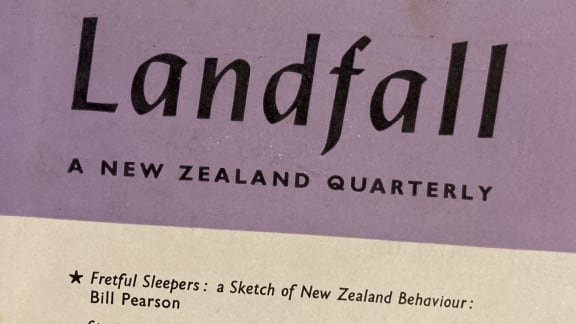
Photo: photo / RNZ Mediawatch
It was mostly mocking - but also aptly quoted from Bill Pearson's 60-year old essay about the New Zealand character Fretful Sleepers.
"There is no emotion we feel so at home in as moral indignation. There is nothing unites us so much as having someone else to condemn…"
Suppression and fairness
This case revived arguments about the fairness and justice of name suppression.
Many in the media have complained long and loud that the law is outdated, unfair and ineffective in the age of the internet and online social media, but the Contempt of Court Act makes it an offence to intentionally publish any information that could prevent a person from having a fair jury trial.
Penalties include imprisonment for a term not exceeding six months or a fine not exceeding $25,000 for an individual and a fine not exceeding $100,000 for a corporate body, though there are defences for errors made in good faith which reduce the jeopardy for journalists.
In this case, the court granted interim name suppression to preserve the couple’s right to make further application once they are charged - though they were not subsequently charged and did not make another application.
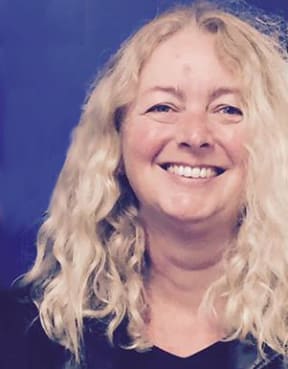
Fran Tyler Photo: supplied
"It's the public outrage that causes the public not to be told," the Massey University tutor and former court reporter Fran Tyler told the Herald, because an actual or anticipated media or public backlash can compel judges to take steps to protect the identity of people.
“The court has the power to prevent an abuse of its own process,” a senior lawyer - who agreed to comment without being named - told Stuff. The lawyer said they had obtained similar orders in the past when the media have become aware a person is likely to be charged.
“There’s a high risk these people could be subject to vigilantism and a risk to their safety,” the University of Canterbury’s law dean Professor Ursula Cheer told Stuff.
But not everyone who might benefit from suppression is able to get it.
A timely investigation in RNZ’s ‘Is this Justice?’ series revealed Pākehā are granted name suppression three times as often as Māori.
Referencing her own past as a court reporter decades ago for Stuff, columnist Rosemary McLeod said the law still works better for “the young well-off and entitled”.
“It’s long past time for the impression of automatic anonymity of the accused if they’re well known or well-connected, and the law is unenforceable anyway up against the internet and social media,” she said
“Privilege compounds offending, surely, it doesn’t diminish its seriousness,” she argued.
But in his column for the Gisborne Herald, retired journalist John Jones pointed out that although William Willis's parents are a barrister and a district court judge, “they could not be regarded as real public figures”.
“The runaway couple have acknowledged that they did not tell their families of their plans. Why then the need to name any of them?” he asked.
'It appears that the 100-year-old suppression practices are past their used-by date," Fran Tyler and another former court reporter Dr Cathy Strong concluded in an article in 2018.
"Its frustrating for the media. I've been there. The public have the right to know who has offended against our laws," Fran Tyler told Mediawatch in 2019.
"But the courts do have very good reasons for suppressing names. In some cases it's to protect the victims and there may be other cases which may be prejudiced. The names will come out at some point. We just have to be patient and trust the judge has made the decision for a very good reason," she said.
Stuff reported that its questions to Willis’ mother Judge Mary-Beth Sharp drew a stern legal response.
On Wednesday evening, her lawyers sent a letter to Stuff claiming that the allegations put to the judge by Stuff were “highly defamatory”.
Judge Sharp's lawyer requested that the statements not be repeated in any way to a third party - and Stuff said the letter also warned Stuff about approaching nearby residents at the Wānaka house for comment.
Judge Sharp, via her lawyer, sought urgent confirmation that the “line of inquiry” would cease immediately, Stuff reported.
But it didn't stop Stuff reporting Judge Sharp relinquished her share in her son’s horse-breeding business the day her son was revealed as the Wānaka lockdown breaker.


